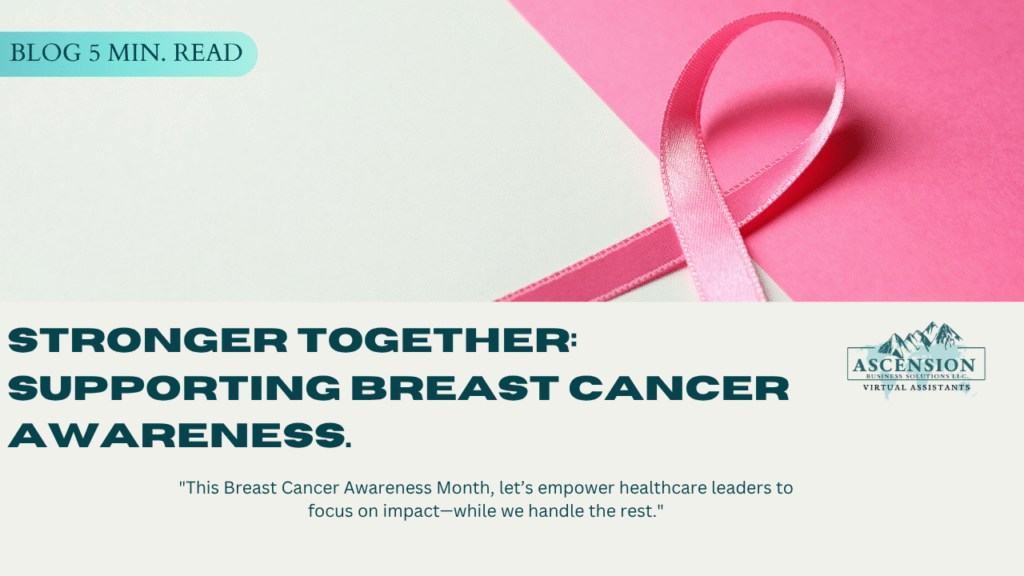Introduction: A Month of Purpose and Pressure
October is Breast Cancer Awareness Month—a time when the global healthcare community unites to raise awareness, drive early detection, and support individuals and families impacted by breast cancer. The World Health Organization’s Global Breast Cancer Initiative reminds us that stronger systems, timely diagnosis, and integrated care are critical to reducing mortality and improving recovery outcomes.
For home care and healthcare leaders, this month brings both purpose and pressure. Awareness campaigns, screening programs, follow-ups, and patient support initiatives often stretch teams to their limits. Leaders know the importance of showing up for patients and communities, but many also face staff burnout, administrative bottlenecks, and resource gaps.
The question becomes: How can leaders rise to this challenge without overwhelming their teams?
The answer lies in three interconnected strategies: leadership, partnerships, and delegation.
The Leadership Role in Breast Cancer Awareness Month
Healthcare and home care leaders are not only administrators — they are vision-setters. During Breast Cancer Awareness Month, their leadership shapes how effectively campaigns and care initiatives reach the community.
Guiding the mission: Leaders set the tone by aligning their teams with both organizational goals and the broader WHO vision of early detection and care equity.
Balancing capacity with compassion: A successful leader knows that overstretched staff cannot deliver consistent, compassionate care. Protecting team bandwidth is part of protecting patients.
Driving innovation: Leaders who embrace new solutions — such as healthcare virtual assistants and delegation strategies — ensure that systems remain resilient even during periods of peak demand.
Leadership in this context is about foresight: preparing systems to handle more without breaking, and ensuring no patient falls through the cracks.
Partnerships: No Healthcare Leader Stands Alone
Breast Cancer Awareness Month is not just about individual organizations. It’s about collaboration. Partnerships are the backbone of system-strengthening.
With advocacy groups: Collaborating with nonprofits and advocacy organizations amplifies messaging and expands outreach.
With technology providers: Tools such as patient navigation apps, scheduling systems, and communication platforms streamline workflows.
With virtual assistant solutions: External partners who specialize in healthcare delegation can reduce administrative strain and free up clinical bandwidth.
WHO’s framework emphasizes the need for collaboration across government, private, and community sectors. For healthcare leaders, leaning into these partnerships builds resilience. It means that during October’s heightened demand, no single team shoulders the entire load.
Delegation: The Hidden Strength of Resilient Healthcare Leaders
Of all the tools available to healthcare leaders, delegation is often the most underutilized — yet it can be the most transformative.
Delegation doesn’t just mean handing off small tasks; it means strategically reassigning responsibilities so leaders and clinicians can focus on high-value work.
Here’s how healthcare virtual assistants (VAs) can support during Breast Cancer Awareness Month:
Administrative Support: Managing awareness event RSVPs, scheduling patient follow-ups, and handling intake forms.
Patient Communication: Sending reminders, sharing educational materials, or answering common questions.
Campaign Management: Supporting social media awareness campaigns, newsletters, and digital outreach.
Data & Reporting: Logging campaign participation, analyzing outcomes, and preparing reports for leadership review.
By delegating these non-clinical but critical tasks, healthcare leaders protect their staff from burnout while ensuring patients receive timely support.
Case in Point: Delegation in Action
Imagine a home care agency launching a breast cancer awareness campaign. The team anticipates a surge of phone calls, inquiries about screening, and additional follow-up appointments.
Without delegation: Nurses spend valuable time fielding phone calls instead of focusing on patient care. Leaders are bogged down in campaign logistics. Stress levels spike, and some patients experience delays in follow-up.
With delegation: Two trained healthcare virtual assistants manage calls, appointment scheduling, and patient reminders. Nurses remain focused on direct care, leaders oversee strategy rather than micro-tasks, and the campaign runs smoothly with measurable results.
This is the difference leadership and delegation can make — not just during October, but year-round.
Practical Strategies for Leaders This October
Map your campaign workload. Anticipate when demand will surge (e.g., screening drives, community events).
Identify delegable tasks. Separate clinical duties from administrative ones, and assign the latter to VAs or support staff.
Set up clear protocols. Ensure VAs know when to escalate to clinical staff.
Integrate communication. Keep your whole team — from nurses to VAs — aligned through shared platforms and daily updates.
Measure success. Track reduced clinician workload, improved patient engagement, and campaign reach.
The Role of Ascension Business Solutions
At Ascension Business Solutions (ABS), we stand with healthcare and home care leaders during Breast Cancer Awareness Month. Our vision aligns with WHO’s call for stronger systems and integrated support.
We train healthcare virtual assistants to take on administrative and coordination tasks.
We create delegation frameworks that allow leaders to maintain oversight without micromanaging.
We focus on relieving stress, so leaders can lead and clinicians can care.
Our goal is not to “sell” but to support healthcare leaders in carrying the weight of October — and every month thereafter. Because when leaders delegate effectively, both staff and patients thrive.
Conclusion: Leading with Strength, Supporting with Partnership
Breast Cancer Awareness Month is a reminder that healthcare is bigger than any single organization. It is about ecosystems — networks of leaders, teams, patients, and partners working together for a common purpose.
For home care and healthcare leaders, the key to resilience lies in leadership, partnerships, and delegation. With the right support, you don’t just raise awareness in October — you build systems that last.
This October, let’s ensure no leader carries the weight alone and no patient faces breast cancer without timely, compassionate support.
Let’s Connect
If you’re a home care or healthcare leader preparing for the demands of Breast Cancer Awareness Month, now is the perfect time to explore how delegation can ease your team’s load.
👉 Connect with Ascension Business Solutions today to learn how our trained Healthcare Virtual Assistants can support your organization. Together, we’ll build systems that empower leaders, protect teams, and ensure every patient gets the care they deserve.

